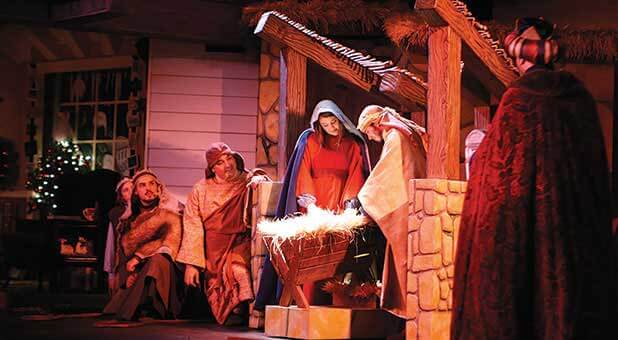Campaigning for Christmas But it isn’t just theme parks and dramas that keep the name of Christ alive this time of year. Numerous activists, citizen groups and websites have also risen up to counteract an offensive that has long sought to make Christmas politically incorrect.
Indeed, in many public schools, Christmas programs have morphed into “holiday shows” and Christmas vacations have been labeled “winter break.” Last December, parents in Montana and Massachusetts declared carols a form of bullying. And in October a Bordentown, N.J., school district banned “religious” Christmas music at any school concerts.
Such opposition prompted Bodie Hodge to compile The War on Christmas. The new book dispels popular misconceptions about the holiday, points out religious components of holiday displays are indeed constitutional, and encourages people not to surrender to anti-Christmas forces. A writer and researcher for Answers in Genesis, Hodge grew frustrated by outspoken opposition to the Bible, creationism and prayer that has snowballed into attempts to censor all things Christmas.
“The thing that really surprised me was when we started to see attacks on nativity scenes,” he says. “Even private businesses were attacked.
“One year I went to Australia, and they had nativity scenes all over the place. A lot of people down there are not Christians, but they didn’t have a problem with it. Yet in the States, it was a big deal. We noticed this trend and said, ‘This is an attack of the enemy.’”
The veteran author hopes to educate the public—especially children who have learned to equate Christmas with Santa Claus and presents.
“We want to teach people what Christmas is all about,” Hodge says. “We want to get back to a focus on Christ and worshipping Him.”
Still other incidences show encouraging signs of pushback—like what happened when a woman in Arizona asked for help in 2009 after the U.S. Forest Service rejected her child’s designs for ornaments that would say “Happy Birthday, Jesus” and “Merry Christmas” to be displayed on the Capitol Christmas tree. Thanks to intervention from Alliance Defending Freedom (ADF), the federal agency dropped its rule against ornaments with a religious theme.
More recently, in 2012, a pair of pro-crèche forces turned back attempts to remove nativities from public places. Last June, the Texas legislature adopted a law protecting Christmas and other holiday celebrations in public schools from legal challenges.
“I am optimistic about our ability to educate more companies and government officials about their ability to celebrate Christmas,” says Jon Scruggs, legal counsel for ADF. “But I also know that many companies and government officials will prefer to pander to ‘politically correct’ sentiments.”
After battling the PC police since forming its “Keep Christ In” campaign in 2005, Tim Wildmon of the American Family Association (AFA) thinks the anti-Christmas crowd is weakening.
“People want to express themselves about Christmas,” says the president of AFA, which each year ships up to 1 million “Merry Christmas” lapel buttons. “I think the general public sees the ridiculousness of not calling something by its real name.”
So while some are pessimistic about the fate of holiday tussles, Wildmon takes the opposite view. He says that over the past eight years, the percentage of retailers limiting the use of Christmas greetings has declined from about 75 percent to less than 25 percent.
Mat Staver of Liberty Counsel is encouraged too. He organized Liberty Counsel’s “Friend or Foe” Christmas campaign a decade ago to educate the public—and, if necessary, go to court. Among the group’s victories are overturning bans on nativity scenes, helping seniors prohibited from singing carols at nursing homes, and coming to the aid of students whose schools dictated not wearing red or green during December.
Liberty Counsel issues a “Help Save Christmas” action pack annually, including legal memorandums about the holiday, buttons, bumper stickers and sample newspaper advertisements. The group also maintains a “Naughty or Nice” list spotlighting retailers that permit “Merry Christmas” and other observances while frowning on those who expunge all references.
Liberty Counsel assembled its first list after Boston renamed its 40-foot-tall Christmas spruce a “holiday tree,” ignoring the tree’s historic significance: Nova Scotia’s shipped a Christmas tree to Boston annually since 1917 to honor the city for coming to its aid after the Halifax Explosion in Halifax Harbour.
Staver observes numerous parallels in the retail world. “We realized you couldn’t find Christmas trees on the street; they were called ‘holiday trees’ and ‘holiday decorations,’” he says. “There were clerks who couldn’t return a ‘Merry Christmas’ greeting even if the customer initiated it.”
And Wildmon points to another development: “Stores like Wal-Mart and Sears now have a Christmas shop within their stores—something that didn’t exist a few years ago. How are you offending people when you acknowledge Christmas? That’s bizarre.”












































